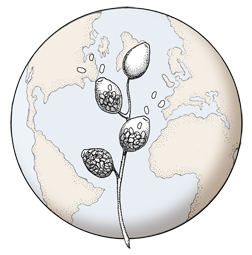Publication Type:
Journal ArticleSource:
Journal of Phytopathology, Blackwell Publishing Ltd, Volume 160, Number 5, p.220–228 (2012)URL:
http://dx.doi.org/10.1111/j.1439-0434.2012.01888.xKeywords:
amino acids, arbuscular mycorrhizal fungi, cocoa, Phytophthora megakarya, plant diseaseAbstract:
The effects of some selected arbuscular mycorrhizal (AM) fungi, Gigaspora margarita and Glomus mossae on the growth and the role of soluble amino acids of two contrasting cocoa cultivars (ICS84 tolerant and SNK10 sensitive) against black pod disease caused by Phytophthora megakarya were investigated. Root colonization by AM fungi is between 50 and 70% 18 weeks after planting. Tested AM fungi significantly increased all the plant growth parameters (height, number of leaves, shoot and root matter) and P uptake as compared to non-inoculated plants in pot experiments. AM fungi inoculated cocoa reduced the disease severity. Compared to the control, the soluble amino acid levels increased with inoculation of the AM fungi strains in the necrotic stems of disease on inoculated cocoa plants. Significant relationships between amino acids and disease severity observed for two cocoa cultivars imply that the induction of specific amino acids synthesized by leaves, such as arginine, cysteine and glutamic acid, may represent potential candidate molecules for adaptation of such cultivars to P. megakarya disease. Inoculating seedlings with AMF in nurseries could enhance the development of cocoa plants protected against P. megakarya.


